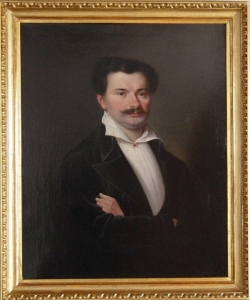 Polish poet and geographer, participated in the November 1830 Uprising, decorated with Virtuti Militari Cross in recognition of his service. After the uprising fell, he organized help for the insurgents who had to emigrate; an emissary of Gen. J. Bem, he stayed in Leipzig, Dresden (there he met with Adam Mickiewicz, who praised Pol’s early poetical attempts), and later in France. After returning in 1832 to Galicia, he was involved in the patriotic movement. His most popular work, Piesn o ziemi naszej (Song of Our Land), is a poetic cycle describing the journey through the country’s lands visited by Pol; it resulted in an increase in the interest in the national natural scene and culture among Polish citizens. His attempts at educational and social activities among the peasantry brought limited results. Disappointed, he took to natural studies, especially to geography. At that time he wrote poems whose subjects are connected with the mountains, and continued research work in
Polish poet and geographer, participated in the November 1830 Uprising, decorated with Virtuti Militari Cross in recognition of his service. After the uprising fell, he organized help for the insurgents who had to emigrate; an emissary of Gen. J. Bem, he stayed in Leipzig, Dresden (there he met with Adam Mickiewicz, who praised Pol’s early poetical attempts), and later in France. After returning in 1832 to Galicia, he was involved in the patriotic movement. His most popular work, Piesn o ziemi naszej (Song of Our Land), is a poetic cycle describing the journey through the country’s lands visited by Pol; it resulted in an increase in the interest in the national natural scene and culture among Polish citizens. His attempts at educational and social activities among the peasantry brought limited results. Disappointed, he took to natural studies, especially to geography. At that time he wrote poems whose subjects are connected with the mountains, and continued research work in
ethnography and geography of Poland. Despite limited scientific output, in 1849 he received the nomination to become professor of ‘common, physical and comparative geography’ at the Jagiellonian University in Cracow, where he was the first person in Poland to obtain the chair in geography.
In spite of his deteriorating eyesight, ending in complete blindness from 1868 onwards, he took an active part in the scholarly life of the city. He gave lectures in geography, among them a paper in which, in contrast to German or Russian scholars, he proposed a thesis that Poland is a compact region and as such can exist as an independent political entity. In 1863 he published a handbook for theology students on the Geography of the Holy Land in two volumes which secured him St Gregory Cross given to him by Pope Pius IX.








 Muzeum Lubelskie w Lublinie otrzymało certyfikat - "MIEJSCE PRZYJAZNE SENIOROM"
Muzeum Lubelskie w Lublinie otrzymało certyfikat - "MIEJSCE PRZYJAZNE SENIOROM"

